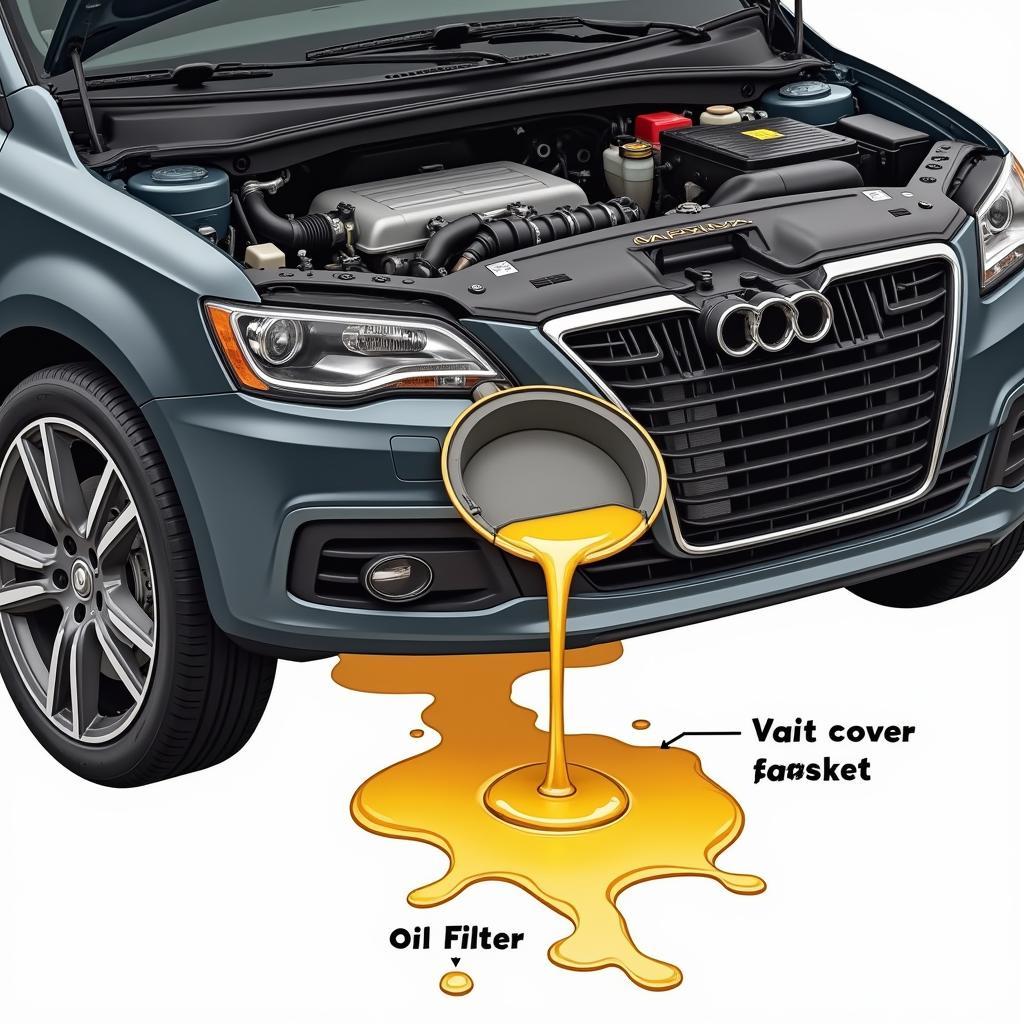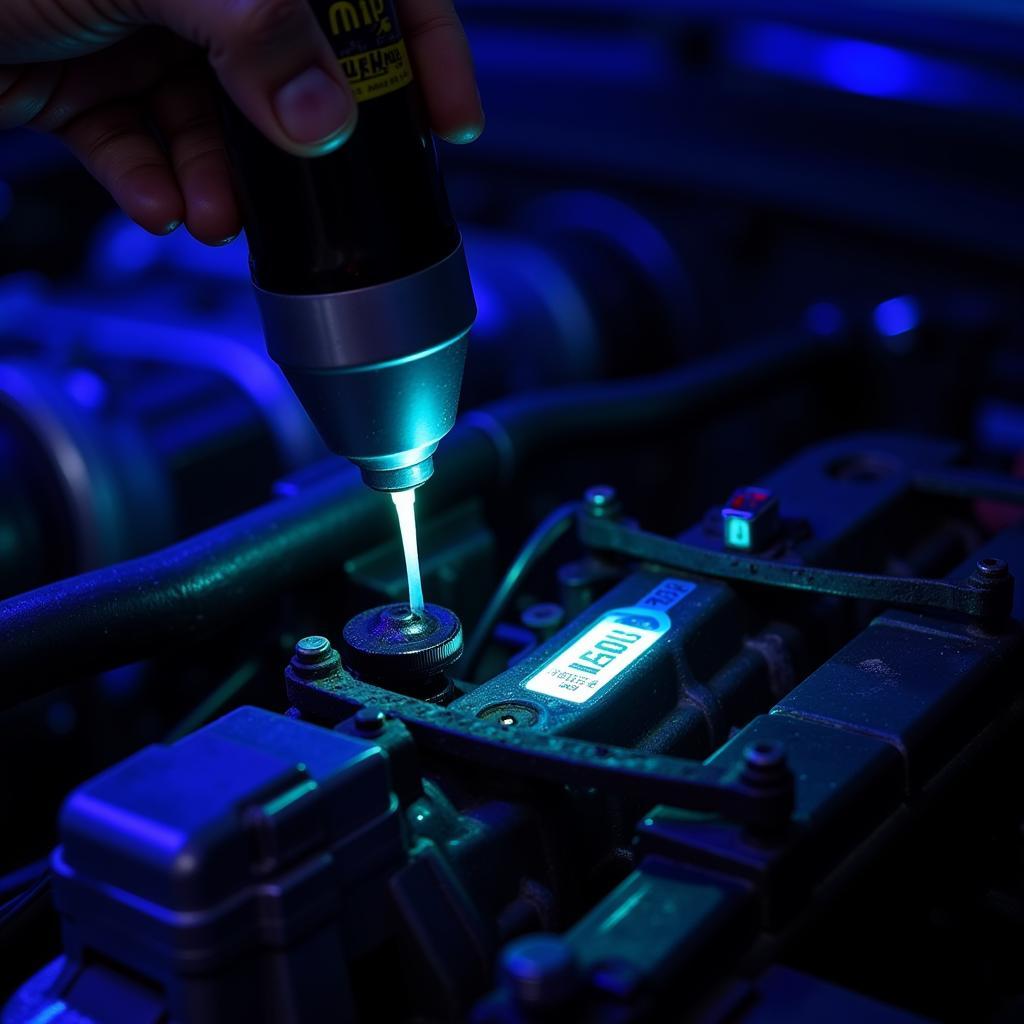Oil leaks are a common car problem that, if left unchecked, can lead to serious engine damage. This guide will help you diagnose and fix an oil leak on your car, whether you’re a DIY enthusiast or plan to take it to a mechanic.  Detecting an oil leak on a car engine
Detecting an oil leak on a car engine
Identifying the Source of the Leak
The first step in Fixing An Oil Leak On A Car is identifying the source. Start by parking your car on a clean, dry surface overnight. In the morning, check for oil spots underneath. The color and location of the stain can provide clues. Fresh oil is typically light brown or amber, while older oil is darker and thicker. Check your dipstick to confirm if you are indeed losing oil.
After confirming an oil leak, you’ll need to pinpoint the source. Thoroughly clean the engine with a degreaser and then inspect it visually. Look for fresh oil traces. A UV dye can help you track down leaks more easily.  Using UV dye to locate an oil leak
Using UV dye to locate an oil leak
Common leak sources include:
- Oil Pan Gasket: This gasket seals the oil pan to the bottom of the engine. A leak here is often indicated by oil pooling directly beneath the engine.
- Valve Cover Gasket: Located on the top of the engine, a leaky valve cover gasket can cause oil to drip down the sides of the engine.
- Oil Filter: A loose or improperly installed oil filter can also cause leaks.
- Rear Main Seal: This seal prevents oil from leaking where the engine and transmission meet. A leak here often results in oil dripping near the rear of the engine.
Is your car struggling with high RPMs? Check out this helpful guide: hiw do i fix car that has high rpm.
Fixing the Oil Leak
Once you’ve identified the source, the next step is fixing the leak. Some repairs, like tightening the oil filter, are relatively simple. Others, like replacing the oil pan gasket, are more complex and might require professional assistance.
DIY Repairs
-
Tighten the Oil Filter: If the leak is coming from the oil filter, try tightening it first. If the leak persists, replace the filter.
-
Add a Stop-Leak Additive: For minor leaks, a stop-leak additive can sometimes temporarily seal the leak. However, this is not a permanent solution.
Professional Repairs
For more complex repairs, it’s best to consult a qualified mechanic. They have the tools and expertise to handle more involved tasks like replacing gaskets and seals. Fixing a thrown timing belt can sometimes lead to misfires; you can find helpful advice here: fixed thrown timing belt now car is misfiring.
Preventing Future Oil Leaks
Regular maintenance is key to preventing oil leaks. Here are a few tips:
-
Regular Oil Changes: Changing your oil according to your car’s recommended schedule helps keep the engine clean and prevents sludge buildup, which can contribute to leaks.
-
Inspect Gaskets and Seals: Regularly inspect your engine’s gaskets and seals for signs of wear and tear.
-
Use High-Quality Oil: Using high-quality oil that meets your car’s specifications can help prolong the life of your engine’s seals and gaskets.
“Regularly checking your oil level and addressing leaks promptly can prevent costly engine damage down the road,” says John Smith, a certified automotive technician with over 20 years of experience. He adds, “Don’t underestimate the importance of preventative maintenance.”
A vacuum leak can also impact your car’s performance. Learn how to address that issue here: how much to fix a vacuum leak on my car.
Conclusion
Fixing an oil leak on a car can range from a simple DIY fix to a more complex repair requiring professional help. Identifying the source of the leak is crucial for effective repair. Regular maintenance and prompt attention to leaks are key to preventing further engine damage. If you’re unsure about tackling the repair yourself, don’t hesitate to contact a qualified mechanic. For any further assistance, feel free to connect with AutoTipPro at +1 (641) 206-8880 or visit our office at 500 N St Mary’s St, San Antonio, TX 78205, United States. Water damage to your car can also be a major issue. Find out more about fixing water damage here: fixing water damaged car.
FAQ
-
How serious is an oil leak? An oil leak can range from a minor inconvenience to a major engine problem. Ignoring a leak can lead to serious engine damage.
-
How much does it cost to fix an oil leak? The cost of fixing an oil leak varies depending on the source and complexity of the repair. A simple oil filter replacement is relatively inexpensive, while replacing a rear main seal can be quite costly. If you’re experiencing a misfire, check out this resource: how much to fix a misfire in a car.
-
Can I drive my car with an oil leak? Driving with a significant oil leak can damage your engine. It’s best to address the leak as soon as possible.
-
How can I tell if my car has an oil leak? Look for oil spots under your car and check your oil level regularly.
-
What causes an oil leak? Oil leaks can be caused by worn gaskets, seals, or loose components.
-
How can I prevent oil leaks? Regular maintenance, using high-quality oil, and inspecting your engine regularly can help prevent oil leaks.
-
What is the best oil leak sealant? There are various oil leak stop-leak additives available. Consult a mechanic for recommendations based on your specific situation.




Leave a Reply